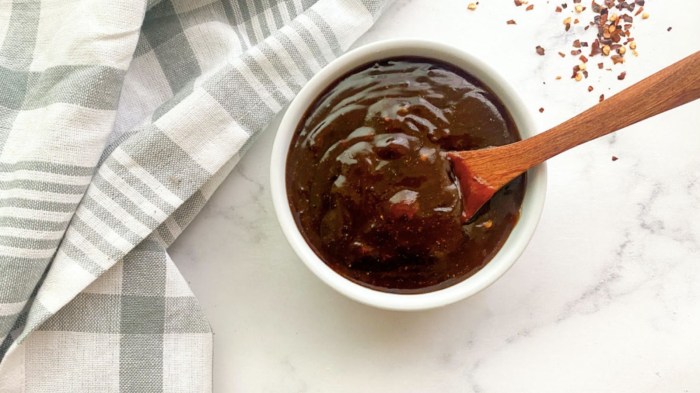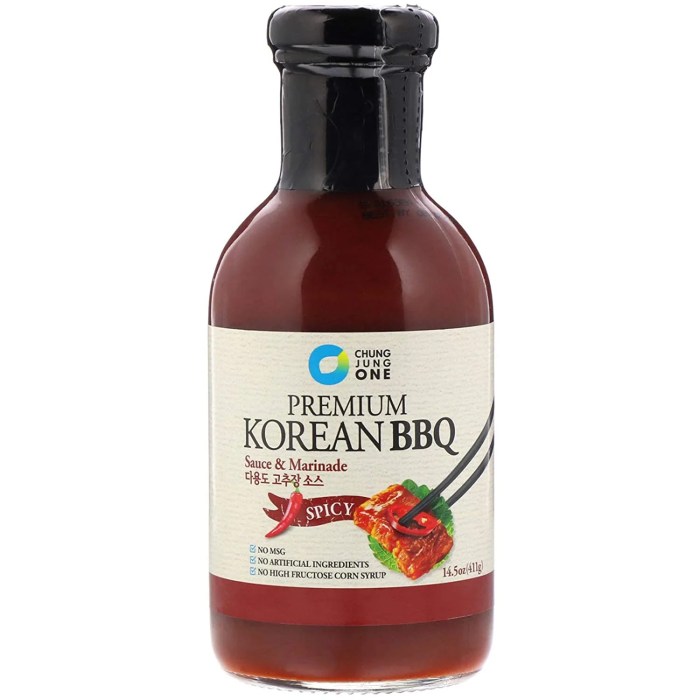BBQ Korean Sauce Recipe A Flavorful Guide
Korean BBQ Sauce: A Flavorful Journey: Bbq Korean Sauce Recipe

Source: mashed.com
Bbq korean sauce recipe – Korean BBQ sauce, a cornerstone of Korean cuisine, boasts a complex and intensely savory flavor profile. Its vibrant character stems from a harmonious blend of sweet, spicy, salty, and umami notes, creating a truly unforgettable culinary experience. This versatile sauce elevates any dish it graces, from grilled meats to vegetables and even noodles.
Introduction to Korean BBQ Sauce
The unique flavor profile of Korean BBQ sauce is characterized by a balance of sweet and spicy elements, often with a noticeable umami depth. This is achieved through a careful combination of ingredients, including gochujang (fermented chili paste), soy sauce, garlic, ginger, and sugar. The sweetness often comes from fruits like pears or apples, which add a subtle complexity.
The spiciness is adjustable depending on the amount of gochujang or gochugaru (Korean chili flakes) used.
Common ingredients include gochujang, soy sauce (ganjang), sesame oil, garlic, ginger, sugar (or honey or corn syrup), and sometimes rice wine or mirin. The precise proportions vary widely depending on the desired flavor profile, but these ingredients form the foundation of most Korean BBQ sauces.
While the exact origins are difficult to pinpoint, Korean BBQ sauce’s development is deeply intertwined with the history of Korean grilling and fermentation techniques. Its cultural significance lies in its role as a key element in many popular Korean dishes and its ability to bring people together around a shared culinary experience. It’s a sauce that reflects the country’s rich culinary heritage and its appreciation for bold, balanced flavors.
Gochujang-Based Sauce Variations
Gochujang, a staple ingredient in Korean cuisine, provides the signature depth and spice to many BBQ sauces. Here are three variations, each offering a distinct level of heat:
| Name | Ingredients | Instructions | Spice Level |
|---|---|---|---|
| Mild Gochujang BBQ Sauce | 1/4 cup gochujang, 1/4 cup soy sauce, 2 tbsp honey, 1 tbsp rice vinegar, 1 clove garlic (minced), 1 tsp grated ginger | Combine all ingredients in a small saucepan. Simmer over low heat for 5 minutes, stirring occasionally, until slightly thickened. | Mild |
| Medium Gochujang BBQ Sauce | 1/3 cup gochujang, 1/4 cup soy sauce, 2 tbsp honey, 1 tbsp rice vinegar, 2 cloves garlic (minced), 1 tsp grated ginger, 1/2 tsp gochugaru | Combine all ingredients in a small saucepan. Simmer over low heat for 5 minutes, stirring occasionally, until slightly thickened. | Medium |
| Spicy Gochujang BBQ Sauce | 1/2 cup gochujang, 1/4 cup soy sauce, 1 tbsp honey, 1 tbsp rice vinegar, 3 cloves garlic (minced), 1 tbsp grated ginger, 1 tbsp gochugaru | Combine all ingredients in a small saucepan. Simmer over low heat for 5 minutes, stirring occasionally, until slightly thickened. | Spicy |
Non-Gochujang Based Sauce Variations
While gochujang is traditional, delicious Korean BBQ sauces can be created without it. These recipes showcase alternative approaches to achieving a similarly rich and flavorful outcome.
- Soy-Garlic BBQ Sauce: This sauce relies on a strong soy sauce base enhanced with garlic, ginger, and a touch of sweetness. Its flavor is savory and slightly sweet, with a prominent garlic note.
- Advantages: Simple to make, readily available ingredients.
- Disadvantages: Lacks the depth and complexity of gochujang-based sauces.
- Sweet and Sour BBQ Sauce: This option features a balance of sweet and sour notes, achieved with the addition of vinegar, sugar, and a hint of spice. It’s lighter and brighter than gochujang based sauces.
- Advantages: Versatile, pairs well with a variety of meats.
- Disadvantages: Might be less intense in flavor for some palates.
Ingredient Substitutions and Adaptations
Many substitutions can be made to accommodate dietary needs or ingredient availability. For example, maple syrup or agave nectar can replace honey, tamari or coconut aminos can substitute soy sauce for gluten-free options, and other chili pastes can partially replace gochujang, though the flavor will differ.
These substitutions will alter the final flavor profile. For instance, using maple syrup will introduce a more pronounced sweetness, while tamari will result in a slightly earthier taste. Adapting for vegan diets is straightforward by omitting any honey or fish sauce. Gluten-free versions can be made by using tamari or coconut aminos instead of soy sauce.
Serving Suggestions and Pairings
Korean BBQ sauce complements a wide array of meats and dishes. Its rich, savory flavor enhances the taste of grilled meats, vegetables, and even rice dishes.
| Meat | Best Sauce Pairing | Flavor Combination Description |
|---|---|---|
| Beef | Mild Gochujang BBQ Sauce | The sauce’s subtle sweetness complements the richness of the beef, creating a balanced and flavorful combination. |
| Pork | Medium Gochujang BBQ Sauce | The medium spice level of the sauce cuts through the fattiness of the pork, creating a harmonious blend of flavors. |
| Chicken | Soy-Garlic BBQ Sauce | The savory garlic notes of the sauce enhance the chicken’s flavor without overpowering it. |
Visual Guide: Illustrating Key Techniques, Bbq korean sauce recipe
Properly prepared gochujang paste has a deep reddish-brown color and a thick, slightly sticky consistency. It should not be watery or overly dry.
The ideal consistency of a finished Korean BBQ sauce depends on the recipe, but it generally ranges from a slightly thick to a medium consistency. It should be glossy and visually appealing, indicating proper simmering.
A properly simmered sauce will have a noticeably thicker consistency than one that hasn’t been simmered long enough. The color may also be slightly richer and more intense.
A delicious BBQ Korean sauce recipe often incorporates sweet and savory elements. For a deeper, richer flavor, consider adding a homemade tomato base; you might find inspiration in this excellent guide on tomato sauce to can recipe for preserving your harvest. The resulting sauce, whether canned or fresh, will add a complex dimension to your BBQ Korean sauce, enhancing its overall taste profile.
Storage and Shelf Life

Source: walmartimages.com
Homemade Korean BBQ sauce should be stored in an airtight container in the refrigerator. It will typically last for 5-7 days. For longer storage, freezing is recommended. Freeze the sauce in ice cube trays for easy portioning, then transfer the frozen cubes to a freezer bag.
To thaw, transfer the frozen cubes to the refrigerator overnight. Avoid thawing at room temperature to prevent bacterial growth. Signs of spoilage include mold growth, unusual discoloration, or an off-putting odor.
Clarifying Questions
Can I make this sauce ahead of time?
Yes, Korean BBQ sauce stores well in the refrigerator for up to a week. Freezing is also an option.
What if I don’t have gochujang?
Several alternatives exist, such as a blend of chili paste and brown sugar, though the flavor will differ.
Is this sauce gluten-free?
It depends on the soy sauce used. Look for tamari or gluten-free soy sauce for a gluten-free version.
How can I adjust the spice level?
Reduce or increase the amount of gochujang or chili flakes to control the heat.













